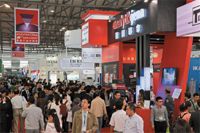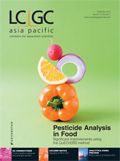Analytica China Conference
A look at what's in store for chromatographers at the Analytica China Conference. The conference and the exhibition will take place at the Shanghai New International Expo Center, Shanghai, People's Republic of China, from 24–26 September 2014.
The People's Republic of China faces a number of challenges such as in the production and packaging of food, the quality control of drugs, air pollution in large cities, and diseases that feature heavily in modern society such as diabetes mellitus. It is these and other topics that will be the focus of this year's Analytica China Conference, the title of which is "Analytical Chemistry — Science We Need". The conference and the exhibition will take place at the Shanghai New International Expo Center, Shanghai, People's Republic of China, from 24–26 September 2014.
At the Analytica China Conference, scientists from Australia, China, Germany, Japan, Poland, South Korea, Switzerland and the United States will present lectures on various fields in analytical chemistry. In addition to the plenary lecture, which will feature a panel of prominent speakers representing various disciplines, there will be five additional lecture sessions. These sessions will cover topics such as drugs and traditional Chinese medicine, food safety, proteomics and metabolomics, separation techniques and mass spectrometry, environmental analysis, and bioanalysis. The programme of events will be rounded out by four seminars on topics such as quality control, gas chromatography (GC), multidimensional liquid chromatography (LC), and high performance liquid chromatography (HPLC) column selection.
Science We Need
Visitors at the exhibition will see the latest technology in the analysis, biology, and laboratory sectors, and attendees at the Analytica China Conference will find out about some of the latest developments in analytical chemistry in two plenary sessions. Topics covered will include the use of ambient ionization methods, such as secondary electrospray ionization [SESI]) for breath analysis by Prof. Renato Zenobi (ETH Zurich, Switzerland); and the mechanisms of photoionization in atmospheric pressure mass spectrometry (APPI–MS) will be discussed by Professor Thorsten Benter (University of Wuppertal, Germany).

Photograph: Messe München International
Professor Benter will also reveal the latest developments in photoionization and chemical ionization in capillaries. Based on these findings, Professor Oliver Schmitz will introduce a new photo-ionization source for coupling GC to an atmospheric pressure orbitrap mass spectrometer in a session on separation techniques and MS. In the same session, Jack Syage (Mass Spectrometry Center of Excellence, USA), who developed APPI independently of Andries Bruins, will compare electrospray ionization (ESI) using APP in relation to ion suppression for drug samples in urine using HPLC.
New types of ionization methods will also be the focus of a series of lectures on food safety. Professor Heiko Hayen (Westfälische Wilhelms-Universität Münster, Germany) will give a presentation on dielectric barrier discharge microplasma ionization for analyzing pesticides in food.
As an alternative to the equipment-oriented presentations, there will also be lectures that deal with applications based on theoretical issues and questions. For example, there will be some presentations on traditional Chinese medicine and the ingredients in Chinese medicinal plants. There will also be several lectures that deal with the latest developments in sample preparation (sample-taking and preconcentration). The extent to which sample preparation influences subsequent metabolome analysis will also be examined. In many cases, complex samples such as those used in environmental or metabolome analysis are processed using two-dimensional gas chromatography (GC×GC). This analysis method will be introduced in two lectures including one from one of the pioneers of GC×GC: Professor Philip Marriott (Monash University, Australia).
Besides chromatography and mass spectrometry methods, other new types of techniques will also be discussed. For example, Prof. Kazuhiko Fujiwara from Akita University in Japan, will explain the potential of a new plasma resonance sensor chip based on gold nanoparticles in a series of lectures on environmental analysis and bioanalysis. In the same lecture series, Professor Albert Sickmann (ISAS, Germany) will report on the varying degrees of hydrolysis efficiency of various trypsin qualities in proteomics.
A total of 63 English lectures are on the agenda for the conference, which is being organized by Messe München International and the Chinese Chemical Society (CCS). The conference is also represented by its Chairmen, Professor Erkang Wang (Changchun Institute of Applied Chemistry, Chinese Academy of Science, People's Republic of China), Professor Oliver J. Schmitz (University of Duisburg-Essen, Germany), and the Executive Chair, Professor Jin-Ming Lin (Tsinghua University, Peking, People's Republic of China).
Additional information is available online at www.analyticachina.com
Regulatory Deadlines and Supply Chain Challenges Take Center Stage in Nitrosamine Discussion
April 10th 2025During an LCGC International peer exchange, Aloka Srinivasan, Mayank Bhanti, and Amber Burch discussed the regulatory deadlines and supply chain challenges that come with nitrosamine analysis.







